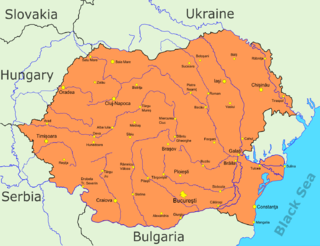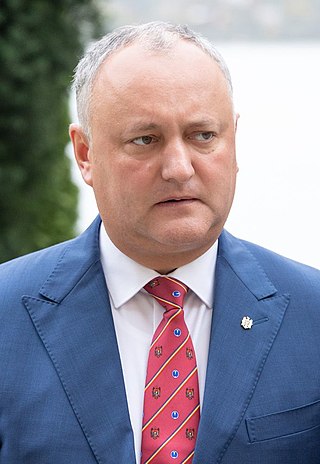
The unification of Moldova and Romania is a popular concept and hypothetical unification in the two countries that began during the Revolutions of 1989. The Romanian Revolution in 1989 and the independence of Moldova in 1991 further contributed to the development of a movement for the unification of the two Romanian-speaking countries. The question of reunification is recurrent in the public sphere of the two countries, often as a speculation, both as a goal and a danger. Though historically Romanian support for unification was high, a March 2022 survey following the Russian invasion of Ukraine indicated that only 11% of Romania's population supports an immediate union, while over 42% think it is not the right moment.

Modern Moldova-Romania relations emerged after the Republic of Moldova gained independence from the Soviet Union in 1991. Pan-Romanianism has been a consistent part of Moldovan politics, and was adopted in the Popular Front of Moldova's platform in 1992. The official language of Moldova is Romanian. The peoples of the two countries share common traditions and folklore, including a common name for the monetary unit – the leu. At present, relations between the two states are exceptionally friendly, especially on account of the pro-Romanian administration of Maia Sandu in Moldova.

Igor Dodon is a Moldovan politician who served as the 5th president of Moldova from 2016 to 2020. He currently serves as the leader of the Party of Socialists of the Republic of Moldova since 2024. He served as Minister of Economy and Trade in the governments of Vasile Tarlev and Zinaida Greceanîi from September 2006 to September 2009 and was a member of the Parliament of Moldova from 2009 to 2016. He lost his bid for re-election in 2020 to Maia Sandu, whom he had defeated four years earlier in the 2016 Moldovan presidential election.

Maia Sandu is a Moldovan politician who has been president of Moldova since 24 December 2020. She is the founder and former leader of the Party of Action and Solidarity and was prime minister of Moldova from 8 June 2019 until 14 November 2019, when her government collapsed after a vote of no-confidence. Sandu was minister of education from 2012 to 2015 and member of the parliament of Moldova from 2014 to 2015, and again in 2019.

The Party of Action and Solidarity is a liberal political party in Moldova. The PAS was founded by Maia Sandu, the former Minister of Education and the incumbent president of Moldova. A pro-European party, it is an observer of the European People's Party (EPP) and the International Democracy Union (IDU).

The Chișinău Independence Day Parade is one of the events of the Independence Day of Moldova held by the Moldovan National Army. The parade is held in Chișinău, Moldova on August 27 every 5 to 10 years on Great National Assembly Square.

Andrei Năstase is a Moldovan politician who served as Deputy Prime Minister and Minister of Internal Affairs from 8 June 2019 to 12 November 2019. He was also a member of Parliament of Moldova in 2019. Năstase was the leader of the Dignity and Truth Platform from 2015 to 2021.

Snap parliamentary elections were held in Moldova on 11 July 2021. Following the resignation of Ion Chicu, the position of Prime Minister became vacant, with the Parliament being obligated to form a new government within three months. After the expiration of the constitutionally mandated period and two failed attempts to win parliamentary approval for the proposed cabinets, the Constitutional Court ruled on 15 April that the circumstances justifying a dissolution of the parliament were met. President Maia Sandu signed the decree dissolving the Parliament on 28 April and snap parliamentary elections were called on.
This page lists public opinion polls conducted for the 2021 Moldovan parliamentary election.

Presidential elections were held in Moldova on 1 November. The fourth direct elections since independence in 1991, voters had the possibility to either elect a new president or re-elect the incumbent Igor Dodon. Because no candidate received a majority of votes in the first round, a run-off between the top two candidates, Maia Sandu and Dodon, was held on 15 November. Maia Sandu won the second round with 58% of the vote, becoming the first female President of the country and the first winner from the Party of Action and Solidarity (PAS).
The COVID-19 pandemic in Moldova was a part of the worldwide pandemic of coronavirus disease 2019 caused by severe acute respiratory syndrome coronavirus 2. The virus was confirmed to have reached the Republic of Moldova on 7 March 2020, when a Moldovan woman who returned from Italy tested positive for the novel coronavirus. As the number of infected people started to rise during the next days, the Parliament declared a state of emergency on 17 March 2020 for the entire territory of the Republic of Moldova for a period of 60 days.

Presidential elections were held in Moldova on 20 October 2024, with a runoff held on 3 November. Incumbent president Maia Sandu, who won the first round, and former Prosecutor General Alexandr Stoianoglo, who was the runner-up, contested the runoff, with Sandu winning a majority of votes and being re-elected for a second and final term.
Events from the year 2021 in Moldova.
Events from the year 2021 in Romania.
COVID-19 vaccination in Romania started on 27 December 2020. It was announced that the process would be divided into three phases. Medical personnel would be vaccinated first, followed by the population at risk, and finally by the rest of the population. Vaccination was declared free and non-mandatory. As of March 2022, five types of vaccines were authorized to be used in Romania. This is the largest vaccination campaign in the modern history of Romania.

COVID-19 vaccination in Moldova started on 2 March 2021. During the COVID-19 pandemic, Moldova was very reliant on external help from other countries, having received donations of vaccines from Romania, the United Arab Emirates, Russia and China. In fact, Moldova's vaccination campaign started due to a donation from Romania on 27 February 2021 composed of 21,600 Oxford–AstraZeneca COVID-19 vaccine doses, with the first vaccinated person in the country being Alexandru Botizatu. Romania had promised earlier, on 29 December 2020, that it would help Moldova with a collaboration project which would include 200,000 vaccine doses to help Moldova combat the pandemic, but also other matters of the country. Romania subsequently made more donations on 27 March 2021 with 50,400 vaccine units; on 17 April 2021 with 132,000 vaccine doses, fulfilling its promise to Moldova; and on 7 May 2021 with 100,800 vaccine units even though this surpassed the promised 200,000 vaccine doses.

The next parliamentary elections in Moldova are to be held no later than 11 July 2025.
A political crisis began on 1 September 2021 in Romania, engulfing both major coalition partners of the Cîțu Cabinet, namely the conservative-liberal National Liberal Party (PNL) and the progressive-liberal Save Romania Union (USR). The crisis also involved former prime minister Ludovic Orban (PNL), who was set to face Prime Minister Florin Cîțu (PNL) in a leadership election during the party congress on 25 September, with the latter eventually replacing the former. Orban would eventually resign from his position as President of the Chamber of Deputies, with him and his supporters subsequently splitting from the PNL, in order to form the Force of the Right (FD).

On 18 September 2022, protests in Moldova began in the capital city of Chișinău, demanding the resignation of the country's pro-Western government, amid an energy crisis causing rising natural gas prices and inflation, caused in part by the Russian invasion of Ukraine.
 Minister of Foreign Affairs Bogdan Aurescu affirmed his support for the collaboration, declaring that “We are and wish to remain the most important and sincere partner of Moldova and its citizens, based on the special relationship, grounded in the community of language, history, and culture that bind us and the strategic bilateral partnership for the EU integration of the Republic of Moldova.” [12]
Minister of Foreign Affairs Bogdan Aurescu affirmed his support for the collaboration, declaring that “We are and wish to remain the most important and sincere partner of Moldova and its citizens, based on the special relationship, grounded in the community of language, history, and culture that bind us and the strategic bilateral partnership for the EU integration of the Republic of Moldova.” [12]  President Maia Sandu expressed her appreciation for Romania's support to the country, stating “These vaccine doses will be enough to vaccinate the entire healthcare staff. We are grateful to Romania’s president Klaus Iohannis, prime minister Florin Cîțu and the Romanian people for the vaccine donation and the immense solidarity they show." [11] [12] [35]
President Maia Sandu expressed her appreciation for Romania's support to the country, stating “These vaccine doses will be enough to vaccinate the entire healthcare staff. We are grateful to Romania’s president Klaus Iohannis, prime minister Florin Cîțu and the Romanian people for the vaccine donation and the immense solidarity they show." [11] [12] [35]  The collaboration was praised by the European Commission, with President Ursula von der Leyen calling it "a beautiful gesture of European solidarity". [12]
The collaboration was praised by the European Commission, with President Ursula von der Leyen calling it "a beautiful gesture of European solidarity". [12]  The WHO gave support to the cooperation, with its representative in Romania Miljana Grbic conveying that "working together will ensure the best possible protection and care for citizens in both countries". [36]
The WHO gave support to the cooperation, with its representative in Romania Miljana Grbic conveying that "working together will ensure the best possible protection and care for citizens in both countries". [36] 













